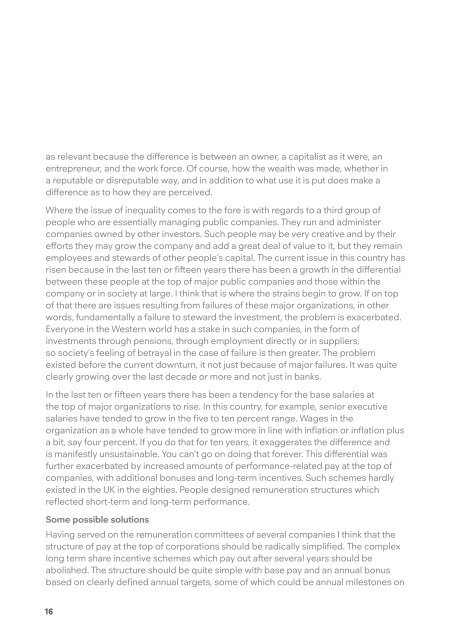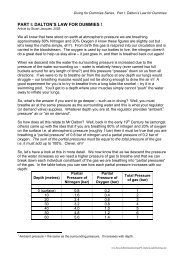Download a .pdf of Sir Mark Moody Stuart's full Beyond ... - Plymouth
Download a .pdf of Sir Mark Moody Stuart's full Beyond ... - Plymouth
Download a .pdf of Sir Mark Moody Stuart's full Beyond ... - Plymouth
Create successful ePaper yourself
Turn your PDF publications into a flip-book with our unique Google optimized e-Paper software.
as relevant because the difference is between an owner, a capitalist as it were, anentrepreneur, and the work force. Of course, how the wealth was made, whether ina reputable or disreputable way, and in addition to what use it is put does make adifference as to how they are perceived.Where the issue <strong>of</strong> inequality comes to the fore is with regards to a third group <strong>of</strong>people who are essentially managing public companies. They run and administercompanies owned by other investors. Such people may be very creative and by theirefforts they may grow the company and add a great deal <strong>of</strong> value to it, but they remainemployees and stewards <strong>of</strong> other people’s capital. The current issue in this country hasrisen because in the last ten or fifteen years there has been a growth in the differentialbetween these people at the top <strong>of</strong> major public companies and those within thecompany or in society at large. I think that is where the strains begin to grow. If on top<strong>of</strong> that there are issues resulting from failures <strong>of</strong> these major organizations, in otherwords, fundamentally a failure to steward the investment, the problem is exacerbated.Everyone in the Western world has a stake in such companies, in the form <strong>of</strong>investments through pensions, through employment directly or in suppliers,so society’s feeling <strong>of</strong> betrayal in the case <strong>of</strong> failure is then greater. The problemexisted before the current downturn, it not just because <strong>of</strong> major failures. It was quiteclearly growing over the last decade or more and not just in banks.In the last ten or fifteen years there has been a tendency for the base salaries atthe top <strong>of</strong> major organizations to rise. In this country, for example, senior executivesalaries have tended to grow in the five to ten percent range. Wages in theorganization as a whole have tended to grow more in line with inflation or inflation plusa bit, say four percent. If you do that for ten years, it exaggerates the difference andis manifestly unsustainable. You can’t go on doing that forever. This differential wasfurther exacerbated by increased amounts <strong>of</strong> performance-related pay at the top <strong>of</strong>companies, with additional bonuses and long-term incentives. Such schemes hardlyexisted in the UK in the eighties. People designed remuneration structures whichreflected short-term and long-term performance.Some possible solutionsHaving served on the remuneration committees <strong>of</strong> several companies I think that thestructure <strong>of</strong> pay at the top <strong>of</strong> corporations should be radically simplified. The complexlong term share incentive schemes which pay out after several years should beabolished. The structure should be quite simple with base pay and an annual bonusbased on clearly defined annual targets, some <strong>of</strong> which could be annual milestones onthe road to longer term targets. The bonus should be payable largely in shares whichwould have to be held for very long periods, probably to retirement. In this way there isgenuine alignment <strong>of</strong> interests between executives and long term shareholders.This however only addresses the relatively easy part <strong>of</strong> the problem, aligning pay withperformance. It does not address the major problem <strong>of</strong> the excessive differentialsbetween the employees at the top <strong>of</strong> a company and the average employee. It is thisdifferential which causes the major strains and feelings <strong>of</strong> inequity in society.The first step that needs to be taken is to prevent the differential widening further.As a result <strong>of</strong> adverse publicity and the challenging economic climate, furtherwidening <strong>of</strong> the differential has largely halted and in fact there have been reductionsin the overall amounts rewarded. These reductions are quite large in financial terms,but given the size <strong>of</strong> the gap, the absolute differential remains great.The available leversThere are four levers which could further reduce differentials in future. There could beconcerted action by shareholders. There could be agreement between companiesin certain sectors such as the financial sector to reduce competition. Public outragecould make large differentials socially unacceptable. Lastly, legislative controls couldbe introduced.One cannot place too much reliance on that as shareholders have for many yearshad considerable powers which they have generally not used. Furthermore, the fundmanagers representing many shareholders are <strong>of</strong>ten themselves the beneficiaries <strong>of</strong>the same remuneration systems so have little incentive to press for radical change.In spite <strong>of</strong> this, there are encouraging signs that shareholders are beginning to playan active part in addressing the issue.It is unlikely that companies will unite to agree common policies in relation toremunerations policies, not least because this would be illegal under competition law.This means that efforts by individual companies to lead the market downwards willhave to rely on shareholders to encourage spread <strong>of</strong> better practice other companies.Public outrage, or the threat <strong>of</strong> public outrage, has undoubtedly had an effect.A number <strong>of</strong> individuals have waived large bonuses or been happy to accept lessthan their previously agreed entitlements for fear <strong>of</strong> a public outcry. Although publicand media outrage is capricious and it is the most visible and not the most egregiousrewards that draw attention, there is a cumulative effect which begins to make the16 17
















